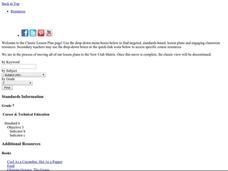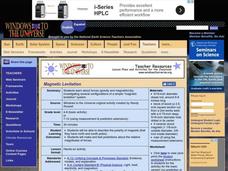American Chemical Society
Exothermic, Endothermic, and Chemical Change
Scientists can't observe bonds breaking or forming, so how do they distinguish between exothermic and endothermic reactions? Young scholars complete two experiments to do just that. They monitor temperature change and calculate the...
Curated OER
Picture This! Building Photo-Based Writing Skills
High schoolers analyze photographs as a development activity for their literacy skills. They will review the 6 Q's feature for analyzing photographs and analyze a variety of photographs and then write comments in the space around the...
ProCon
Tablets vs. Textbooks
Learners decide if tablets should replace textbooks in K-12 schools. They watch four pro and con videos and discover the history of the tablets-versus-textbooks debate. As a bonus, the resource allows them to submit their own comments...
EngageNY
Grade 5 Math Module 1: End-of-Module Assessment
The last installment of the 18-part Grade 5 Math Module 1 is an end-of-module assessment. Scholars answer questions that require explaining the connection between powers of 10 and place value, rewriting decimals in different forms,...
Curated OER
Winter Holidays Around the World
How much do you know about the holidays around the world? Second graders put their knowledge to the test with a 14-day instructional activity about global celebrations. They read informational text, employ KWL charts, and compare and...
Curated OER
Telling Time Lesson Plan
Judy Clocks are a great invention. Here, learners review telling time to hour and half hour on Judy clocks, begin telling time to quarter hour, use clock stamps to practice, and play computer games using Trudy's Time and Place House...
Curated OER
Goal Setting and Self-Assessment
Third graders review the importance of good study habits as a skill necessary for success in school. They focus on their goals and discuss how this would help to improve grades. They determine how much an F weighs their grade down.
Curated OER
SciPod Studies
Have fun preparing a science podcast. After reviewing vocabulary, learners record audio files to create science vocabulary podcasts for particular units of study. A clever way to incorporate technology.
Curated OER
Exploring Careers
The world is full of possibilities for your ELLs. Help them explore their career options with a lesson that incorporates Internet research and expository writing. Not only will they learn more about their careers of choice, but both...
Curated OER
Vocabulary Comic Strips
Who says comic strips aren’t educational? Prove these naysayers wrong by asking your class members to create a comic strip for a selected vocabulary word. Using online technological tools that provide access to an array of options for...
Curated OER
Evolution Study Guide
Thirty short-answer questions comprise this detailed review of evolution theory. Many of the questions ask scholars to define vocabulary. Because short answers are required, this worksheet will take some time to complete. You could give...
PBS
Predicting/Making a Hypothesis
As an introduction to the hypothesis and testing method of investigation, young history detectives engage in a special investigation of a family artifact. After watching a short video that demonstrates the method, they develop a...
Curated OER
My Angle on Cooling
Students explore how the angle and distance of an object can change it's temperature. After reviewing how the position of the Earth affects the temperature of the planet, student groups design and perform an experiment to test how...
Curated OER
The Quicker the Better? Food Processing
Kids explore food choices, nutrition, and agriculture through a variety of sources and activities. They research unknown words on food labels, test the salt content in canned vs non-canned foods, and discuss processed foods. The lesson...
University of Minnesota
Dendritic Spines Lab
This is your brain on drugs ... literally! Your neuroscientists-in-training examine the evidence of drug use on the human brain and how neurons change their connectivity when altered by drugs. They then work together to create testing...
Curated OER
Carbon Dioxide - Sources and Sinks
Where does all of the carbon dioxide come from that is supposedly leading to climate change? Earth science pupils test animal, plant, and fossil fuels as sources in this investigation. Using an indicator, BTB, they are able to detect the...
Science Friday
Mineral Madness
Science does not need to be as hard as a rock. Pupils test 10 different minerals to determine their properties. The learners observe luster, streak, hardness, and fluorescence for each specimen. Afterwards, they compare and contrast the...
Curated OER
In Touch with Apples
Students read "How To Make an Apple Pie and See the World", the story of a girl who traveled the world to find the ingredients to make her apple pie. They conduct a series of interdisciplinary activities including testing their senses,...
Curated OER
Magnetic Levitation
A thorough investigation of magnetic levitation; this activity has four parts. First, physical scientists play with a wooden dowel and three disc magnets to review polarity and repelling action. Then they experiment with...
Curated OER
The 5 Paragraph Persuasive Essay
This PowerPoint highlights the steps one should follow to craft an organized essay. It addresses the purpose, audience, and format, and briefly touches on prewriting and organizing. This presentation is designed to review the very basic...
Curated Video
Copyright
Introduce your class to the concept of copyright with a series of activities. Pupils first learn about copyright laws and fair use, putting their knowledge to the test with a quick categorizing task. They then watch a video and answer...
American Chemical Society
The Energy Efficiency of Heating Water
Can a small change in laboratory procedures save energy? Scholars test three different methods for heating water in a science lab. Then, they calculate the energy efficiency for each and compare them to determine which uses the least...
Orlando Shakes
Shakespeare in Love: Study Guide
What word has two syllables and means a ray of moonlight? If young readers guessed moonbeam, they are correct! With the Shakespeare in Love study guide, participants test their guessing skills in an exciting game of Shakespeare Taboo...
CCSS Math Activities
Smarter Balanced Sample Items: 6th Grade Math – Target F
Why does one person need 58 peaches; isn't that a bit excessive? This classic math dilemma offers pupils a chance to turn a word problem into an algebraic equation. Grade 6 Claim 1 Item Slide Shows includes this problem as part of a...























